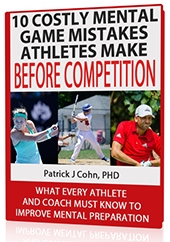
Mental Rehearsal in Sports
Many athletes and coaches think that sports psychologists only teach mental imagery and goals setting. But this is not really the case.
Mental imagery has a place in sport psychology, but it’s only about two percent of what we teach athletes at Peak Performance Sports.
Weather you know it or not, you use mental rehearsal in your sport–in one way or athlete. Sports psychologists and mental game coaches simply structure mental rehearsal for athletes to get the most out of it.
Mental rehearsal, also referred to as imagery, guided imagery, mental practice, or visualization, is defined in sports psychology literature as, “the cognitive rehearsal of a task in the absence of overt physical movement.”
When you imagine or rehearse performing an action with no overt movement, you are using mental rehearsal or mental practice.
The terms mental rehearsal and mental imagery are general terms that encompass imagery, visualization, and mental practice.
Many sports psychologist in the field of sports psychology place too much emphasis on the use of mental imagery or mental rehearsal in performance enhancement.
For example, Chuck Hogan based his entire program on creativity and mental imagery.
I think there is a strong place in performance enhancement for mental imagery, but it should be a small part of your overall sport psychology program.
Most athletes use imagination and mental imagery instinctively to help them prepare for and perform motor skills. When I was an athlete in high school and in college, I would instinctively “rehearse,” or see the play in my mind, before execution.
A mental coach or team coach did not instruct me to use mental rehearsal at that time.
For coaches today, the important topics of discussion in this area are:
- How to structure imagery for the specific person you are coaching.
- How to apply imagery in the sports setting.
Most sport psychology researchers claim that the central nervous system cannot distinguish between actual physical movement and one that is vividly imagined.
Thus, practice occurs when the athlete actually performs the action or when the athlete vividly imagines performing the action because similar neural pathways to the muscles fire in either case.
However, there are other theories in sports psychology that explain and support the use of mental imagery, which I will not delve into here.
Most athletes are not concerned with the supporting research on mental rehearsal. Instead, athletes and coaches want to learn how to apply imagery in a meaningful way in order to enhance performance.
When discussing imagery, most coaches and even sports psychologist focus on “visualization,” but the use of imagery is more than just a “visual” experience.
Athletes use many other modalities or senses when applying imagery, such as auditory and kinesthetic, which may be even more important (especially for kinesthetic learners and performers). Many athletes, such as Jack Nicklaus, popularized visualization or the visual component of mental imagery.
In his book, Golf My Way, Nicklaus says, “I never hit a shot, not even in practice, without having a very sharp, in-focus picture of it in my head.” However, imagery is not all about pictures in one’s mind. Nicklaus may be a visual performer, but not all athletes perform in pictures.
Imagery includes many senses, such as visual, auditory, kinesthetic, olfactory, and touch. Performers or athletes can imagine or re-create all of their normal senses via mental imagery or imagination.
The most important task for the mental game coach is to discover the person’s dominant learning style or performance mode.
Learn more about Peak Performance Sports’ Sports Psychology Coaching Programs
Related Sports Psychology Articles:
- Do Sports Psychology Exercises Work?
- About Mental Training for Sports
- What Happens in a Sports Psychology Session?
Free Mental Toughness Reports

Get instant access to a mental game report to improve your mental toughness. Are you making one or more of these “deadly” mental game mistakes prior to competition? You can improve your mental game with one of our free sports-specific reports below.
with our free mental toughness reports, you’ll:
- Discover if you have positive or negative pregame jitters.
- Identify your pre-competition mental game mistakes.
- Learn the important pregame mental skills to boost your performance and success!
Learn how mental game strategies can boost your mental toughness in sports with Dr. Cohn’s free mental game reports!
